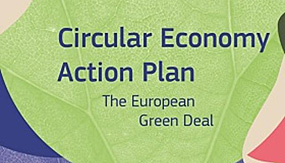
© European Commission
In March, the European Commission published a new Circular Economy Action Plan. Its goal is for products that end up on the market to be designed and manufactured to be durable, repairable, and recyclable. The plan is part of the European Green Deal, a green development programme and roadmap, which aims for a climate-neutral Europe.
The key principle of the Circular Economy Action Plan is that Europe's competitiveness can be strengthened while protecting the environment and empowering consumers. Consumers must have access to reliable information on, for example, the repairability and durability of products, so that they can make sustainable choices.
"The objectives set by the Commission to improve the sustainability of products serve the interests of each of us. Improving the repairability and maintainability of products and extending their service life will hopefully bring more work to the service industries in the future. Right now, all measures to support employment are helping society get back on its feet after difficult times,” says Tuuli Myllymaa, Project Manager of the Circwaste project at the Finnish Environment Institute SYKE.
Sustainable products into the mainstream
With the Circular Economy Action Plan, the Commission wants to make sustainable products mainstream in the EU. Disposable products are restricted, and the destruction of usable unsold products is prohibited.
The new legislation will ensure that products on the EU market last longer, are reusable, repairable and recyclable, and contain as much recycled material as possible instead of recovered materials.
The Action Plan focuses in particular on those sectors and product categories that consume the most natural resources and have the highest potential to increase recyclability. More detailed guidelines will thus be aimed at, for example, electronics, batteries and vehicles, packaging, plastic products, textiles, buildings and food products.
In addition to product policy, the plan addresses waste reduction and the conversion of generated waste into reusable resources. Illegal waste shipments are also being tackled even harder.
The circular economy agenda proposed by the EU Commission:
- Make product sustainability the default within the EU.
- Increase the possibilities of influence of consumers by, e.g. improving knowledge.
- Extend and enhance the life cycle of electronics and information and communication technologies.
- Improve the durability of batteries and increase the potential of their circulation.
- Reduce overpacking.
- Adjust the mandatory requirements for the share of recycled plastics and address micro-plastics and bioplastics issues.
- Promote textile innovation and the reuse market within the EU.
- Promote the principles of the circular economy in construction.
- Replace disposable packaging, containers and cutlery with reusable products in food services.
- Aim to prevent the generation of waste and turn it into high-quality secondary raw materials.
More on the topic
Further information
Circwaste project manager, Head of unit Tuuli Myllymaa, firstname.lastname@ymparisto.fi, tel. +358 295 251 437